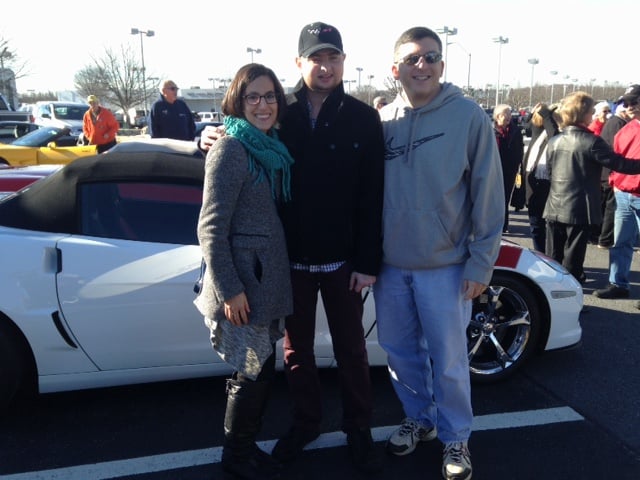Simple Pleasure, Big Impact: ICEE Machine Honors Patient

After each of his treatments at Children’s National, Robby Anthony and his mom Caryn, would stop on the way home to get a slushie. Their special tradition was twofold: amid the throes of vigorous treatment, the sweet treat was a reward for Robby; it was also a necessary source of calories and fluids, and the beverage’s chill offered temporary relief from his pain and nausea. While enjoying his favorite flavor, Cherry Coke, Robby once told his mom, “This is better than any of the pain medicines.”
The treat was medicinal for Caryn too. “As a parent, it sometimes feels like there’s not a lot you can do,” she said, “so it was powerful knowing that there was something I could give Robby to help him feel better.”
In 2012, Robby was hospitalized while on a summer service trip to Colorado. A few weeks later, the otherwise healthy 16-year-old was diagnosed with antiphospholipid antibody syndrome (APS), an autoimmune disease causing excessive blood clots. A care team led by hematologist Dr. Michael Guerrera helped Robby and his parents manage the disease. APS is rare in children and adolescents, and has no cure, but medicines can help control its complications. “Robby managed his own treatment,” Dr. Guerrera said. “He always wanted to know what was going on, what was coming next.”
Despite flare-ups, hospitalizations, and chronic pain from the disease, Robby graduated from Albert Einstein High School in Silver Spring, Md., earned his black belt in karate, and enrolled at Temple University in 2014. Dr. Guerrera helped with the transition by lining up doctors at nearby Children’s Hospital of Philadelphia who could care for Robby if he needed immediate attention.
Robby was admitted to the hospital four times during his freshman year because of increasing clotting in his lungs. It became evident that his case of APS was more aggressive than most, and the complications couldn’t simply be managed, they needed to be fought. He started an aggressive treatment of steroids and chemotherapy, and despite the challenging side effects, he always insisted on returning to school. “The people at Children’s National wanted Robby to be the person he was made to be, his best self,” Caryn said.
Unfortunately, Robby’s sophomore year would only last a few weeks—new treatments and risks forced him home. After a month-long stay in the Children’s National ICU, Dr. Guerrera and hematologist Dr. Jennifer Webb started Robby on experimental treatments, including plasmapheresis, a process of removing plasma, or the “liquid” portion of the blood that contains the antibodies that were attacking Robby’s body. They also began consulting doctors across the country to learn about successful treatments for cases of APS that were as rare and aggressive as Robby was facing.
Because of the complexity of the disease, Robby and his family met with the hospital’s PANDA Palliative Care team, which helps families cope with the stress of dealing with complicated medical problems. At the time, they didn’t know Robby was in his final year; they just knew he was critically ill, and they wanted to help him experience all that life still had to offer him. Though his first request of skydiving couldn’t, in good faith, be accommodated, his second request to drive a Corvette was achieved in a priceless way.
Kate Detwiler, a member of the PANDA team, reached out to the Free State Corvette Club, and they arranged for a meet-up at the Win Kelly dealership in December 2015. When Robby and his family arrived, 40 people were there with 25 Corvettes, the models ranging from the 1960s to brand new. The dealer gave Robby the keys to the newest model on the lot, and Robby led the parade through Clarksville, Md.
“The fact that someone from the hospital would go that far for you…it was very powerful,” Caryn said. “I encountered experiences like that regularly. We didn’t just have medical professionals taking care of our child, we had people who were emotionally connected and authentic in their care.”
The Corvette parade would be Robby’s last taste of adventure; he passed away in July 2016, a few weeks after his 20th birthday and four years after being diagnosed. To help Robby’s zest for life live on, his family wanted to give back to Children’s National in a special way—with the sweet treats he cherished so much during his treatment.
In June 2017, an ICEE machine was installed in Children’s National in Robby’s memory so patients can experience the same relief and joy that he did, thanks to memorial donations in Robby’s honor; a gift from another grateful family, the Alzaabis; and a donation from The ICEE Company. The refreshing drinks are now available for patients in the Ronald McDonald House Family Room in the Center for Cancer and Blood Disorders.
“Robby would have loved this, especially knowing that it was something that would make someone smile, something that would make someone feel better,” Caryn said. “It really captures his spirit and the spark that was alive in him.”
A plaque on the ICEE machine reads, “To quench thirst is the best act of goodness.” Thank you to all who support Children’s National and quench our patients’ thirst for health and wellness, for emotional support, and for joy during some of their most challenging days.
To learn more about how your family can give back to Children’s National, please contact Tammy Glasser, Grateful Family Program, at [email protected]. To make a donation to support expert and compassionate care, visit childrensnational.org/giving.



